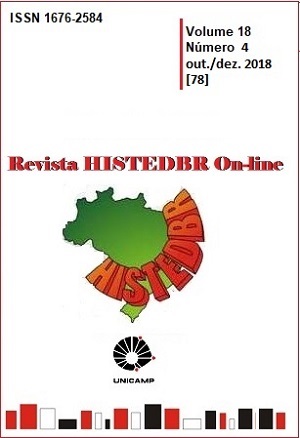Abstract
Analysis of the intellectual Herbert Marshall McLuhan´s (1911-1980) thinking. Specifically on education, understood as a process of moral and cultural direction in line with the interests of hegemonic groups in the United States, between the 1950s and 1960s. The analysis developed from a critical conceptual apparatus of marxian´s thought and involves authors of the various areas of knowledge. This requirement presents itself as a comprehensive approach to the procedures of bibliographic research in History of Education. McLuhan was an intellectual. From this category Gramscian of analysis, we understand the Canadian author in his social relations in capitalist society. The purpose of the analysis of his works, especially those written and published between years 1954 and 1964, is, above all, the clarification of the bond between education and communication. His thinking constructed from an evolutionary notion of history, in which the evolution of letters to the electrical circuits of information technologies, developed in his time, corresponds to human evolution. This is the central thesis of his early work, The Gutenberg´s Galaxy (1962). Developed and continued in the book, Understanding Media (1964). The media-mediated issue of human training was one of the ways in which McLuhan sought to elucidate the question of education for his time.
References
CARPENTER, E.; MCLUHAN, M. (Org.). Revolução na comunicação. 3. ed. Rio de Janeiro: Zahar, 1974.
DEBORD, G. A Sociedade do espetáculo. Rio de Janeiro: Contraponto, 1997.
ENZENSBERGER, H. M. Elementos para uma teoria dos meios de comunicação. São Paulo: Conrad Editora do Brasil, 2003.
GRAMSCI, A. Cadernos do cárcere. Rio de Janeiro: Civilização Brasileira, 2000. v. 2.
IANNI, O. O príncipe eletrônico. Perspectivas. São Paulo, v. 22, p. 11-29, 1999. Disponível em: http://seer.fclar.unesp.br/perspectivas/article/viewFile/2079/1701. Acesso em: 15 maio 2016.
LECLERC, G. Sociologia dos intelectuais. São Leopoldo: Ed. da UNISINOS, 2004.
MANACORDA, M. A. O princípio educativo em Gramsci: americanismo e conformismo. 2. ed. Campinas: Alínea, 2013.
MCLUHAN, H. M. A galáxia de Gutenberg: a formação do homem tipográfico. São Paulo: Companhia Editorial Nacional, 1972.
MCLUHAN, H. M. Cibernética e cultura humana. In: MCLUHAN, S.; STAINES, D. (Org.). McLuhan por McLuhan: conferências e entrevistas. Rio de Janeiro: Ediouro, 2005. p. 75-86.
MCLUHAN, H. M. Os meios de comunicação como extensões do homem. 14. ed. São Paulo: Cultrix, 2001.
MCLUHAN, H. M. Visão, som e fúria. In: LIMA, L. C. Teoria da cultura de massa. 8. ed. São Paulo: Paz e Terra, 2011.
MCLUHAN, H. M.; WATSON, W. Do clichê ao arquétipo. Rio de Janeiro: Record, 1973.
MELO, J. M. de. Teoria da comunicação: paradigmas Latino-Americanos. Petrópolis: Vozes, 1998.
MÉSZÁROS, I. A Educação para além do capital. 2. ed. São Paulo: Boitempo, 2008.
MILLER, J. As idéias de McLuhan. São Paulo: Cultrix; EDUSP, 1973.
RAMOS, M. C. Sobre a importância de repensar e renovar a idéia de sociedade civil. In: RAMOS, M. C.; SANTOS, S. dos. (Org.). Políticas de comunicação: buscas teóricas e práticas. São Paulo: Paulus, 2007.
WILLIAMS, R. Cultura e materialismo. São Paulo: Ed. da UNESP, 2011.
WOLFE, T. Introdução. In: MCLUHAN, S.; STAINES, D. (Org.). McLuhan por McLuhan: conferências e entrevistas. Rio de Janeiro: Ediouro, 2005. p. 7-24.
A Revista HISTEDBR On-line utiliza a licença do Creative Commons (CC), preservando assim, a integridade dos artigos em ambiente de acesso aberto.


